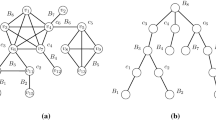Abstract
In the maximum sharing problem ( MS ), we want to compute a set of (non-simple) paths in an undirected bipartite graph covering as many nodes as possible of the first node layer of the graph, with the constraint that all paths have both endpoints in the second node layer and no node in that layer is covered more than once. MS is equivalent to the node-duplication based crossing elimination problem ( NDCE ) that arises in the design of molecular quantum-dot cellular automata (QCA) circuits and the physical synthesis of BDD based regular circuit structures in VLSI design. We show that MS is NP-hard, present a polynomial-time 1.5-approximation algorithm, and show that MS cannot be approximated with a factor better than \(740\over 739\) unless P = NP.
Preview
Unable to display preview. Download preview PDF.
Similar content being viewed by others
References
Antonelli, D.A., Chen, D.Z., Dysart, T.J., Hu, X.S., Khang, A.B., Kogge, P.M., Murphy, R.C., Niemier, M.T.: Quantum-dot cellular automata (QCA) circuit partitioning: problem modeling and solutions. In: DAC 2004. Proc. 41st ACM/IEEE Design Automation Conf., pp. 363–368. IEEE Computer Society Press, Los Alamitos (2004)
Berman, P., Karpinski, M.: \(8 \over 7\)-approximation algorithm for (1,2)-TSP. In: SODA 2006. Proc. 17th Annual ACM-SIAM Symp. on Discrete Algorithms, pp. 641–648. ACM Press, New York (2006)
Cao, A., Koh, C.-K.: Non-crossing ordered BDD for physical synthesis of regular circuit structure. In: Proc. International Workshop on Logic and Synthesis, pp. 200–206 (2003)
Chaudhary, A., Chen, D.Z., Hu, X.S., Niemier, M.T., Ravinchandran, R., Whitton, K.M.: Eliminating wire crossings for molecular quantum-dot cellular automata implementation. In: Proc. of IEEE/ACM International Conference on Computer-Aided Design, pp. 565–571. ACM Press, New York (2005)
Chen, D.Z., Fleischer, R., Li, J., Xie, Z., Zhu, H.: On approximating the maximum simple sharing problem. In: Asano, T. (ed.) ISAAC 2006. LNCS, vol. 4288, pp. 547–556. Springer, Heidelberg (2006)
Di Battista, G., Eades, P., Tamassia, R., Tollis, I.: Graph Drawing: Algorithms for the Visualization of Graphs. Prentice-Hall, Englewood Cliffs (1998)
Eades, P., Whitesides, S.: Drawing graphs in two layers. Theor. Comput. Sci. 131, 361–374 (1994)
Eades, P., Wormald, N.C.: Edge crossings in drawings of bipartite graphs. Algorithmica 11(4), 379–403 (1994)
Edmonds, J.: Paths, trees, and flowers. Canadian Journal of Mathematics 17, 449–467 (1965)
Engebretsen, L., Karpinski, M.: TSP with bounded metrics. Journal of Computer and System Sciences 72(4), 509–546 (2006)
Finocchi, I.: Layered Drawings of Graphs with Crossing Constraints. In: Proc. 9th Annual International Computing and Combinatorics Conference, pp. 357–367 (2001)
Gabow, H.N.: Data Structures for Weighted Matching and Nearest Common Ancestors with Linking. In: SODA 1990. Proc. 7th Ann. ACM-SIAM Symp. on Discrete Algorithms, pp. 434–443. ACM Press, New York (1990)
Garey, M.R., Johnson, D.S.: Crossing number is NP-complete. SIAM Journal on Algebraic and Discrete Methods 4(3), 312–316 (1983)
Lengauer, T.: Combinatorial Algorithms for Integrated Circuit Layout. Wiley, Chichester (1990)
Papadimitriou, C.H., Yannakakis, M.: The traveling salesman problem with distances one and two. Mathematics of Operations Research 18(1), 1–11 (1993)
Tougaw, P.D., Lent, C.S.: Logical devices implemented using quantum cellular automata. J. of App. Phys. 75, 1818 (1994)
Waterman, M.S., Griggs, J.R.: Interval graphs and maps of DNA. Bull. Math. Biol. 48(2), 189–195 (1986)
Author information
Authors and Affiliations
Editor information
Rights and permissions
Copyright information
© 2007 Springer-Verlag Berlin Heidelberg
About this paper
Cite this paper
Chaudhary, A. et al. (2007). Approximating the Maximum Sharing Problem. In: Dehne, F., Sack, JR., Zeh, N. (eds) Algorithms and Data Structures. WADS 2007. Lecture Notes in Computer Science, vol 4619. Springer, Berlin, Heidelberg. https://doi.org/10.1007/978-3-540-73951-7_6
Download citation
DOI: https://doi.org/10.1007/978-3-540-73951-7_6
Publisher Name: Springer, Berlin, Heidelberg
Print ISBN: 978-3-540-73948-7
Online ISBN: 978-3-540-73951-7
eBook Packages: Computer ScienceComputer Science (R0)



